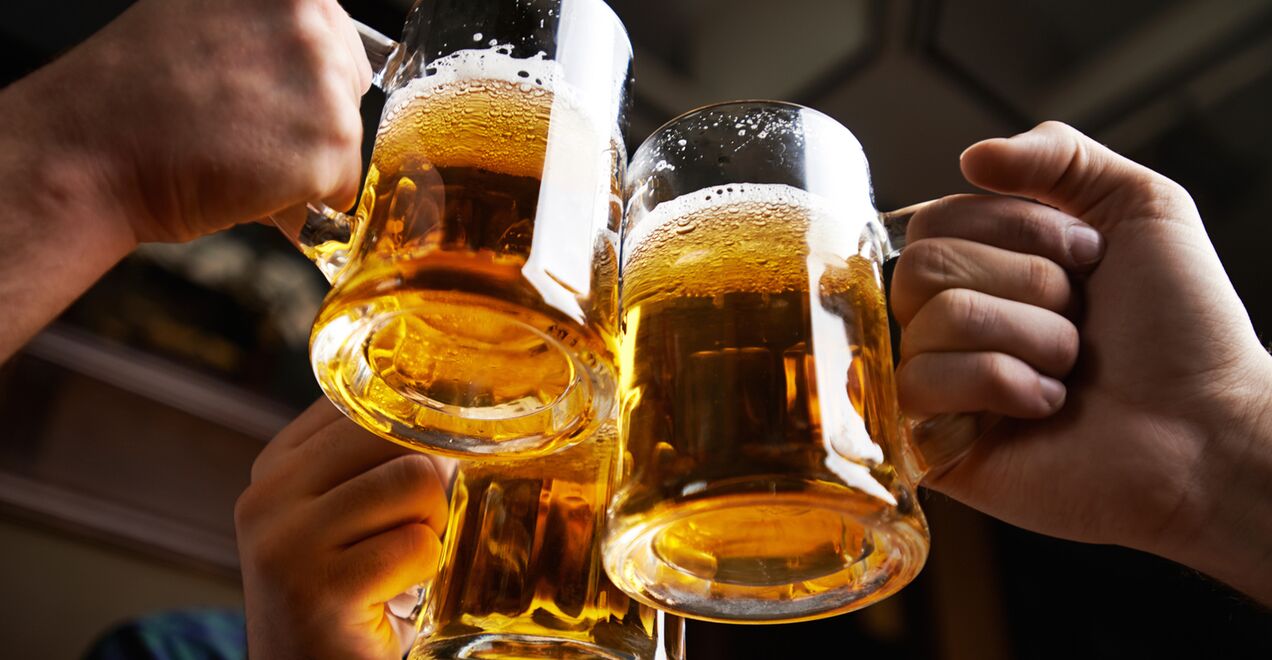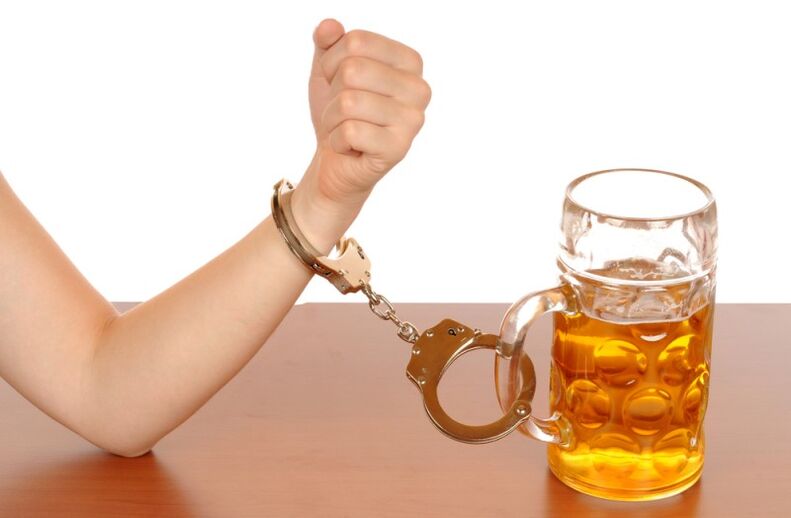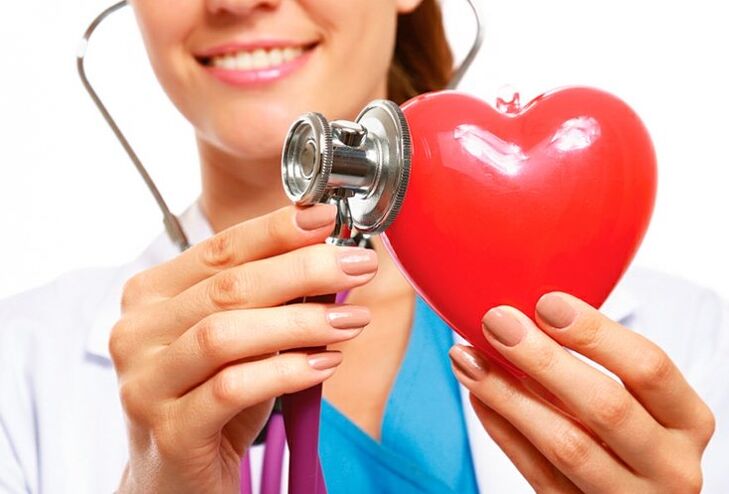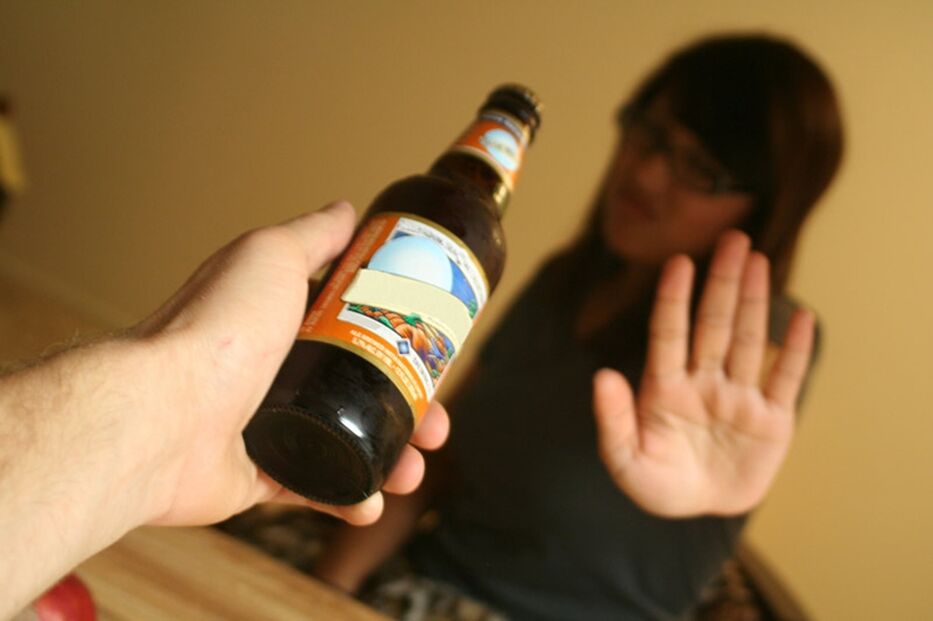Regular consumption of alcoholic beverages should not last long without consequences. So-called beer alcoholism develops much more slowly than strong alcohol dependence, and this is particularly dangerous.

What is the danger of beer
The type of alcohol does not matter for the development of alcoholism. The disease develops when drinking wine, vodka, moonlight, alcoholic cocktails and beer. The only thing influenced by low-alcohol drinks is the rate at which the addiction develops. In this respect, beer is considered one of the most dangerous beverages. And because of this.
- The alcohol in it is 4-14%, which is not a concern for the majority. In fact, harmless drinks like kvass or kefir also contain alcohol.
- The beer is delicious. Unlike vodka or moonshine, which have to be "pressed in", you can taste the intoxicating liquid at will and often want to repeat the enjoyment.
- In terms of popularity, beer ranks first in almost every segment of the population: it is drunk by men, women and teenagers. It is portrayed in obsessive advertisements as an ordinary soft drink.
- In addition to alcohol, most varieties contain a number of substances that negatively affect the endocrine and cardiovascular systems.
If we look more closely at the above facts, it becomes clear that nothing in this drink is safe. Frequent beer drinking is not condemned by society. On the contrary, there are arguments in favor. Recommended to make up for vitamin deficiencies or improve digestion. Because of this, many do not have a psychological stop sign, which is the beginning of heavy alcohol abuse, for example. Consuming vodka is considered shameful and unhealthy, and consuming daily beer is just a form of recreation. Some people don’t even consider it dangerous to give it to children "to promote health".
Signs and characteristics of beer addiction
Standard arithmetic calculations allow you to determine what threatens a beer drink with regular drinking. 1 liter of light beer, 40 ml of pure ethanol, strong varieties - 120-140 ml. In the latter case, the daily intake of alcohol allowed for men was doubled. And if we take into account that 1 liter is drunk only for "overcooking" and then the quantity is not counted, it becomes clear that the consequences of drinking beer cannot be avoided.

From an everyday hobby, addiction smoothly escalates into psychological addiction, while the abuser is quite confident in his or her own well-being and does not put himself or herself on an equal footing with alcoholics, but continues to drink beer every day. You can understand that the disease develops when the following situations occur:
- the upcoming beers will cause impatience and joyful anticipation, postponing less important things for their own sake;
- drunkenness occurs quickly and lasts for a long time;
- we drink at least 1. 5 liters a day, the maximum is not known exactly;
- days when the usual beer can’t be brought in for some reason, they experience irritation, the mood gets worse, only a few new cans or bottles can give it back;
- weak beer seems like water, you want to buy the strongest;
- the surrounding and the mirror begin to notice changes in appearance: bloating of the face, swollen body, bags under the eyes, pale earthy skin;
- shortness of breath, chest pain, increased heart rate;
- the next morning after a beer my head hurts, i want to drink a little more to be "better".
In the background of the daily "hobby", even the appearance of a sign indicates a beer addiction, the symptoms of which will become even stronger in the future.
Narcologists do not recognize the specifics of alcoholism depending on what drink they choose, but agree that beer addiction is very insidious. It is very difficult to identify in the first stage because there are no pronounced changes in lifestyle and human health. For example, a wife in a situation where her husband drinks beer every day does not notice any signs of addiction from the outside.
Beer alcoholism in men is often disguised as a somatic disorder. Heart problems, headaches, and irritability are often confused with accumulated fatigue.
Health effects of beer abuse
The consequences of beer alcoholism affect the intellectual, moral, and personal aspects to a lesser extent. Drink addicts are less likely to lose their professional skills, retain proper behavior and judgment, unlike those who consume strong alcohol every day. This is typical of weak alcoholic beverages: personality degradation develops, but very slowly.

Another danger that awaits beer lovers is the ruin of physical health. Severe daily drinking causes severe chronic diseases:
- myocardial dystrophy;
- angina;
- coronary artery disease;
- gastritis;
- jade;
- fatty hepatosis;
- cirrhosis;
- Neurological disorders.
The foamy drink puts a lot of strain on the kidneys, binds and removes the minerals and vitamins needed by the body: potassium, calcium, ascorbic acid, riboflavin. As a result, the work of all internal organs is interrupted. The constant presence of acetaldehyde in the blood causes swelling, combined with dehydration, and poisons the liver and brain.
It is important that beer contains a lot of so-called phytoestrogens. Taken uncontrollably, these substances contribute to hormonal imbalances in both men and women, leading to reproductive dysfunction, an increased risk of blood clots, and an increase in cholesterol levels.
But the most important thing for which beer alcoholism is dangerous is uncontrolled poisoning. The enjoyment of the taste of the drink overshadows the effect of ethanol, the feeling of euphoria that develops walks away, retouches the problems, makes you buy a few more mugs or bottles. When you drink beer, you rarely remember someone going through it. In addition, addicts often switch from poor alcohol to the abuse of vodka or other "fuel. "
Combating beer alcoholism
The way beer alcoholism is treated depends on the extent of the disease and the situation as a whole. Given that such abuses are not always accompanied by a loss of willpower and mental disorders, it is reasonable for the addict to do all the work alone. Coding from beer alcoholism as a separate specific pathology does not exist. Subcutaneous suturing or hypnosis may not work.

As with other types of addictions, the patient needs to recognize the situation and the need for change. Some will be able to do it themselves, others will need an outside signal. If you are not physically addicted to ethanol - the lack of beer does not lead to a deterioration in well-being - a heart attack - you can do it without the help of a narcologist.
Approximate action program.
- Medicine does not recognize "low-dose" methods of treating alcoholism. It is pointless to recommend 1 bottle a day for people with painful beer addiction. This is self-deception, after a while the problem returns. Only complete denial can help. You have to act according to the "last yesterday" principle. This is the most difficult step, but it is necessary.
- After rejection, it’s worth analyzing what annoys you the most. Boredom, a lot of free time, uninteresting TV, stress at work, quarreling with a friend. Usually, the problems with beer drinking are smoothed out right away. They need to be identified and start dealing with them immediately: instead of watching TV, fix something, go for a walk, start communicating with a forgotten friend, spend more time at work, with the kids, help around the house.
- Boredom and irritability can be alleviated if you find something you love that you can enjoy. Hobbies, new pets, sports, music, learning a foreign language, learning a new profession. Anything that arouses real interest requires effort, but doesn’t leave you feeling an inner compulsion, it does. This is the most effective way to treat psychological addiction.
- You can replace the body with an irresistible desire to drink beer: make juice, green tea, lemonade. At first, a non-alcoholic version of the beer is fine. However, after consuming 2-3 glasses of drink, you urgently need to switch your attention to something urgent. The brain receives the necessary discharge, the psychological stress disappears. If we are not talking about alcoholism, but just a bad habit, you can drastically reduce the amount of beer - drink up to 0. 5 liters 1-2 times a week, ideally even less.
Lack of good mood and interest in life, as well as frequent dizziness and poor self-treatment of beer alcoholism, warrant a visit to a neurologist or endocrinologist, as there is a possibility of metabolic disorders or damage to the central nervous system. nervous system. In this case, your doctor may order a laboratory blood test, dopplerography, brain MRI. If signs of disease are observed, therapy with hormonal or nootropic drugs should be performed.
Preventing beer alcoholism is precluding replacing entertainment with drink, fighting boredom, relaxing, and solving problems. Like other alcoholic beverages, beer is acceptable on the festive table, but it cannot be a constant companion of life or quench thirst.
























